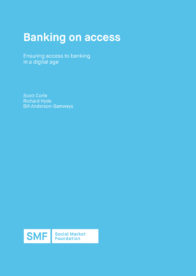The shift towards digital banking, accelerated by the pandemic, creates many opportunities and offers benefits for the economy as a whole – but also brings with it some risks. This report explores future access to retail banking services, and the best way to ensure any such changes take place fairly and sustainably, and no one is left behind.
KEY POINTS
- The COVID-19 pandemic has accelerated change in how we bank. According to our survey, close to two-fifths (38%) of current account holders were using online banking a lot more
- The transition to digital brings opportunities – more innovation, convenience and efficiency – but also risks. Not everyone is ready for an online economy: 7% can’t access digital banking. Older people, those on lower incomes and remote communities mustn’t be left behind.
How to get the best out of the transition to digital? We need new thinking, new methods, and new ways of working for the financial services sector and the public sector.
Our recommendations for ensuring that all can benefit from this evolving banking landscape, and that no one is left behind:
- The Government should establish a “digital economy preparedness” commission, to ensure the UK is appropriately prepared to navigate – as successfully as possible – the technological changes over the coming decades
- Expand the concept of “banking hubs” so people can use a single shared access point to pay money into any bank’s account. These access points should be sited in local authority buildings, such as libraries and leisure centres
- Government should convene a taskforce with the banking industry, relevant UK authorities, and civil society groups to urgently review the banking requirements of the UK population.


